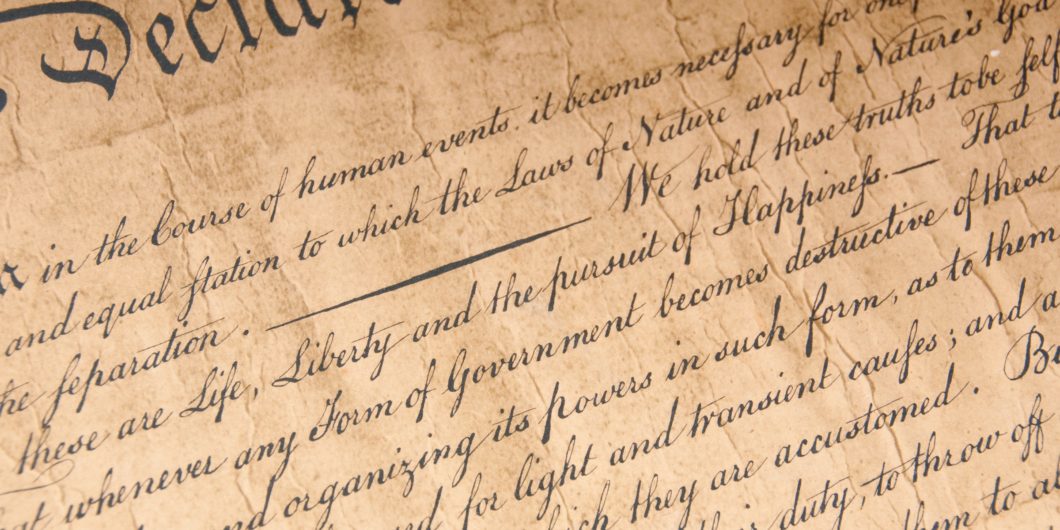The Declaration, the Bible, and Civic Friendship
In “National Conservatism and the Declaration,” David Tucker charges the Claremont Institute for the Study of Statesmanship and Political Philosophy with abandoning the Declaration and adulterously forming an alliance with the “traditionalist” conservative Edmund Burke Foundation. Doing so, Claremont betrays its founding father, Harry Jaffa, who fought traditionalist conservatism relentlessly “since in the United States it was associated with slavery, and above all because [traditionalist conservatism] rejected the principles of the Declaration of Independence.”
This congress of Claremont and Burke, Tucker continues, bears the mark of Christianity and the Bible, and that is bad because “historically—traditionally—in the United States and elsewhere, the Bible and Christianity have been taken to be compatible with racial discrimination and even slavery,” and he adds for authority, “As Lincoln noted in his Second Inaugural, both North and South ‘read the same Bible and pray to the same God.’” Tucker continues, “If the Bible is our surest guide, it is only when it is interpreted properly, a problem the [national conservative] statement of principles ignores.” Tucker points out that the Constitution and Bible have been at times misinterpreted. Of course, the Declaration has been too, even by Tucker, I will contend. Nonetheless, I am confident Tucker and I agree that in order to be our surest guides, both the Bible and Declaration need to be interpreted properly.
We know that historically—traditionally—the North and the South read the same Declaration and interpreted the same Constitution, and many politicians and citizens found them to be compatible with the enslavement of black men, with the result that to this nation conceived in liberty and dedicated to the proposition all men are created equal, the Civil War came.
The U.S. Senator who became Vice President of the Confederacy, Alexander Stephens, claimed in his Cornerstone Speech, “All the essentials of the old [US] constitution, which have endeared it to the hearts of the American people, have been preserved and perpetuated [in the Confederate constitution],” and “All, under our [Confederate] system, stand upon the same broad principles of perfect equality [as are found in the old system].” It was not those in the South but the North, Stephens insisted, who “were attempting to make things equal which the Creator had made unequal.” Stephens claimed that “new science” showed not all races are equal and that “science” authorized the Confederacy to treat black men as slaves and not violate the Declaration’s principle of equality.
In the fifth of the Lincoln-Douglas debates, Stephen Douglas asserted, “the signers of the Declaration of Independence never dreamed of the negro when they were writing that document. They referred to white men, to men of European birth and European descent, when they declared the equality of all men.” Parenthetically, one wonders whether when Douglas delivered that line he had just heard for the first time, and was mulling over, “If English was good enough for Jesus, it’s good enough for me.” Douglas argued the Declaration did not consider blacks when speaking of men, so it did not address whether the black man should be a slave. All the same, although blacks were not seen as citizens, “Humanity requires and Christianity commands, that you shall extend to every inferior being, and every dependent being, all the privileges, immunities and advantages which can be granted to them consistent with the safety of society.” As with abortion today, each state should, Douglas concluded, decide whether slavery was right for its society.
Stephens, Douglas, and Lincoln looked to the Declaration’s principle of equality for guidance but Stephens and Douglas misunderstood what the Founders meant when they used the word “man” in the Declaration. Tucker also appears not to understand man and the principle of equality the way the signers of the Declaration understood them.
Because the coalition of national conservatives’ statement of principles, to which Claremont has signed on, says “Where a Christian majority exists, public life should be rooted in Christianity and its moral vision, which should be honored by the state and other institutions both public and private,” and because one of its prominent members favors legislating “toward a Protestant vision of family life,” Tucker says national conservatives’ tolerance is “merely traditional” and “a mere prejudice” that could eventuate in governmental discrimination against those in America today who are not Christians or Jews, the members of the “majority religions.”
The coalition of the Claremont Institute, Burke Foundation, and national conservatives strikes me as a prudent, moral civic friendship to resist the growing political threat in America to family, civic life, and the Declaration’s “laws of Nature and Nature’s God.”
We know the people who wrote and signed the Declaration lived in a largely Christian country, and most of them were Christians who showed a serious regard for the sacred. Knowing they risked death doing so, they wrote for public notice, “For the support of this Declaration, with a firm reliance on the protection of divine Providence, we mutually pledge to each other our Lives, our fortunes, and our sacred Honor.” In the Declaration, as Jaffa taught, these founders appealed four times to the divine: to Providence, the Supreme Judge of the world, and the Creator. Getting to four, they placed themselves and America under “the laws of Nature and Nature’s God.”
Man, they said, is created—he is made by God but he is less than God—and is measured and ruled by laws beyond politics. With our own eyes we can still see in human nature what they said then: man has limits and can be honorable, friendly, and decent to his fellows—or, like George III and Xi Jinping, man can perpetrate a long train of abuses on his fellows.
The Declaration’s framers did not say Christian dogma or Christian churchmen should rule our politics, nor did they intend that they should. Yet, they were rooted in Christianity and all signs point toward them thinking Biblical morality to be consistent with the actions of reasonable men and good Americans. Additionally, the signs point toward them thinking Biblical morality could elevate a man’s character above others’ and do so without violating the Declaration’s principle of equality.
In connection with the Declaration and the Bible’s place in America’s morality, in particular family morality, I here mention Tucker’s 2019 Law & Liberty essay, “Why Did Harry Jaffa Change His Mind?” In it, Tucker points out that Jaffa came to see his initial view of the Declaration and America’s founding as “inadequate politically” when he grew aware of the mounting political threats to family, civic friendship, and political philosophy. That led Jaffa to a new reading of America’s founding, which allowed him “to find common ground between Jefferson and Lincoln,” and in order “to preserve both the country and political philosophy,” Tucker adds, “Jaffa returned to the beginning, reinterpreting the founding to emphasize its Biblical but, he now argued, no less rational morality.” He not only recognized the Bible’s place alongside the Declaration, he viewed civic friendship to be consistent with it.
Regarding civic friendship, I recall Harry Jaffa stretching for prudential reasons to befriend Mel Bradford in a political cause. Further back in time, we know the colonies of the North and the South formed a civic friendship to declare colonial independence of George III in 1776. Subsequently, despite significant differences on how to treat black men, the states of the North and South found common ground in the 1780s and deliberately constituted an imperfect union, which in time, although not without great pain, would become a more perfect union, a union without slavery and compatible with the Bible and Declaration properly interpreted.
The coalition of the Claremont Institute, Burke Foundation, and national conservatives strikes me as a prudent, moral civic friendship to resist the growing political threat in America to family, civic life, and the Declaration’s “laws of Nature and Nature’s God.”
Nevertheless, even when formed within the limits of nature and nature’s God, civic friendship does not guarantee perfect union. Prudent civic friendship is moderate and not utopian; it enables us “to put in common actions and reasons” (Nicomachean Ethics [1126b11—12]) and so act and govern the way humans created equal can and naturally should.



